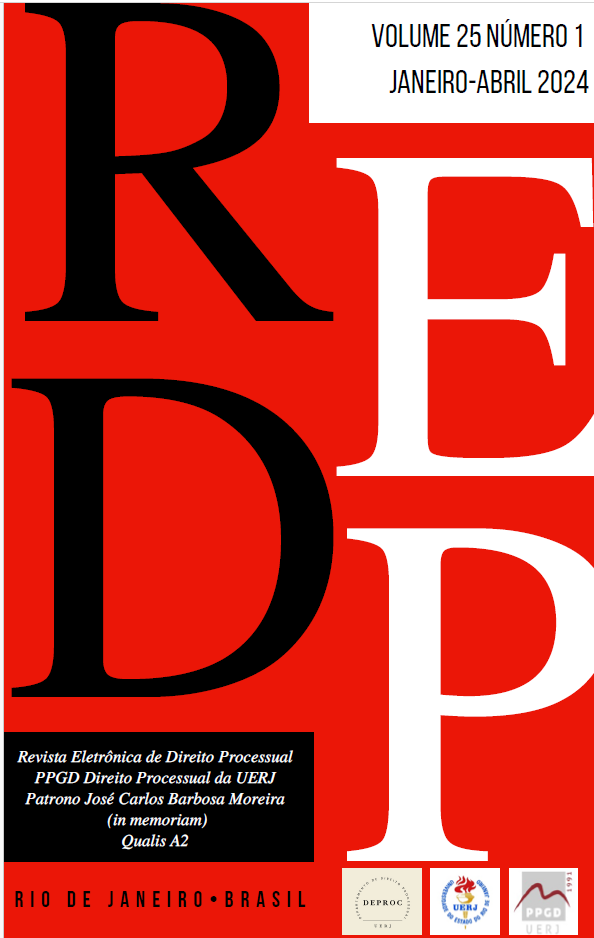A DEMOCRATIZAÇÃO DO ACESSO À JUSTIÇA COMO PONTE PARA TRANSFORMAÇÕES SOCIAIS: ATIVISMO DIALÓGICO EM PROCESSOS ESTRUTURAIS NA COLÔMBIA
DOI:
https://doi.org/10.12957/redp.2024.81902Abstract
Is it possible for the Judiciary to intervene in an active and, at the same time, dialogical way in overcoming calamitous situations that involve systemic and repeated violations of fundamental rights? This article seeks to answer the question through an analysis of the material and symbolic effects of Sentence-T025/04 in the Colombian reality. After a difficult period, marked by armed conflicts throughout the national territory and, particularly, after an internal war of the State against drug cartels, Colombian society celebrated the nineties with enthusiasm, hope for political change and the desire to build a State of effective social well-being. The 1991 Colombian Constitution came with great transformative scopes and sought to promote human dignity, freedom, equality and political and democratic participation through ambitious constitutional provisions. The country's Constitutional Court, in this sense, began to play an important role with regard to the protection of fundamental rights, so that access to justice became a powerful and promising mechanism for redistributing political and social power. The deductive method and bibliographic-documentary research are used. It is concluded that the expression “judicial activism” is multidimensional and contingent, so that using it in an arbitrary and subjective way is to engage in an unscientific and merely rhetorical discussion. The term “judicial activism” cannot be used as an argumentative asset for those who disagree with judicial decisions on certain topics, such as decisions involving public policies, especially because demands involving social, economic and cultural rights will reach the Judiciary, whether the academics whether they want it or not. It must, on the other hand, be studied in all its complexity and from all its facets. Thus, after analyzing the case of forced displacement faced by the Colombian Constitutional Court, the possibility of dialogical activism is seen as an interesting alternative for cases involving structural reforms by the Judiciary.
Downloads
Published
How to Cite
Issue
Section
License
Copyright (c) 2024 Eduarda Peixoto da Cunha França

This work is licensed under a Creative Commons Attribution 4.0 International License.
Todos os artigos publicados na Revista Eletrônica de Direito Processual (REDP) (Departamento de Direito Processual, Universidade do Estado do Rio de Janeiro, Brasil) são licenciados por meio de uma Licença Creative Commons - Atribuição 4.0 Internacional (CC BY 4.0).
Os autores retêm os direitos autorais de seu artigo e concordam em licenciar seu trabalho com a licença CC BY 4.0, aceitando assim os termos e condições específicos desta licença disponíveis no seguinte website: https://creativecommons.org/licenses/by/4.0/legalcode.
- Os autores concedem à REDP o direito de primeira publicação, de se identificar como publicadora original do trabalho e concedem à revista uma licença de direitos não exclusivos para utilizar o trabalho das seguintes formas: Reproduzir, vender e distribuir cópias eletrônicas ou impressas do manuscrito como um todo, de partes específicas do manuscrito e de suas traduções para qualquer idioma;
- O uso do artigo por terceiros é livre, contanto que a integridade da publicação seja mantida e seus autores originais, periódico de primeira publicação e detalhes de citação sejam identificados.
Dentro dos termos da licença, os autores podem entrar em acordos contratuais adicionais separados para a distribuição não exclusiva da versão publicada do trabalho na revista.
Copyright and Licensing
All articles published in the Procedural Law Electronic Review (REDP) (Department of Procedural Law, State University of Rio de Janeiro, Brazil) are licensed under a Creative Commons License - Attribution 4.0 International (CC BY 4.0).
- Authors retain copyright to their article and agree to license their work under the CC BY 4.0 license, thereby accepting the specific terms and conditions of this license available at the following website: https://creativecommons.org/licenses/by/4.0/ legal code.
- Authors grant REDP the right of first publication, to identify itself as the original publisher of the work, and grant the journal a non-exclusive license to use the work in the following ways: Reproduce, sell and distribute electronic or printed copies of the manuscript as a whole, of specific parts of the manuscript and its translations into any language;
- Use of the article by third parties is free, as long as the integrity of the publication is maintained and its original authors, first publication journal, and citation details are identified.
Within the terms of the license, authors may enter into separate additional contractual agreements for the non-exclusive distribution of the published version of the work in the journal.






